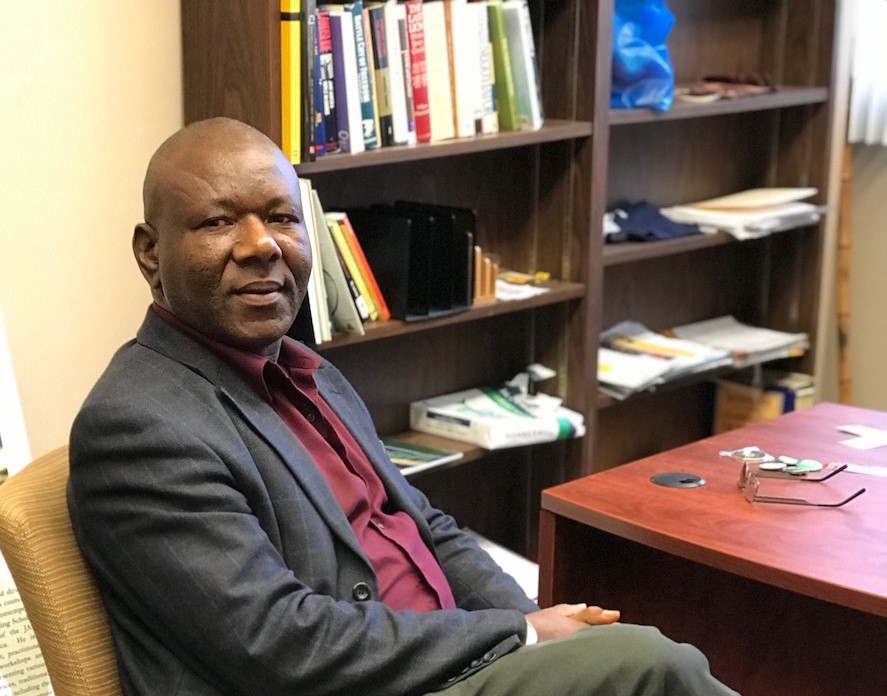Sac State criminal justice program to mark 50-year anniversary
Alexis Roberts – The State Hornet
Criminal Justice department chair Ernest Uwazie has been with the program for 27 years. As the program heads into its 50th year, Uwazie and the department look to make improvements.
March 6, 2018
The Sacramento State criminal justice program is marking its 50-year anniversary this fall, striving to further implement its three-step plan for improvement.
The plan includes globalizing its curriculum, networking with notable alumni and providing students with real-world application opportunities.
Department chair Ernest Uwazie has been teaching criminal justice at Sac State for the last 27 years and said he is passionate about the subject.
Uwazie explained that the criminal justice professors have many different backgrounds, including academic research and being scholars in the field. Uwazie received his Ph.D. from Arizona State University while working as a full-time probation officer.
Senior criminal justice major Gerardo Aldana said that the best part about the program is the diversity of experience among the faculty.
“Some have worked for the CIA or the FBI,” Aldana said. “Overall (the professors) just have a broad range of different backgrounds and never hesitate to share their experiences with us in the classroom.”
Senior Aliyah Rounsville, a criminal justice major with an expressed interest in law, said that the faculty is always there for guidance.
“Professors tend to be more willing to take the time to make sure you understand, and remember you if you show that you care,” Rounsville said. “All the professors have either worked in the field or have extensive experience.”
Uwazie and the rest of the faculty are currently implementing a three-step plan to improve the program. The first part to their strategic plan is globalizing their curriculum.
“Right now, we are looking at a study-abroad program to kick-off the summer of 2019,” Uwazie said. “We are surveying faculty and students to get a sense of their interests on areas (of where they would like to go).”
Uwazie said that he hopes the study-abroad program will make students more culturally competent regarding issues that pertain to criminal justice, including human trafficking, violence and terrorism.
“I want students to know what it feels like to be a police officer, judge, or a lawyer in another country,” Uwazie said.
The next step to the strategic plan is to create bonds with faculty, other students and notable alumni. Next fall the program is planning its annual Criminal Justice Convocation, which Uwazie said is themed “50 years of civil rights.” The convocation is a social seminar where staff, alumni, current students and other keynote speakers attend to discuss a certain topic.
“We will have a panel of local (criminal justice) officials that are dealing with some of these issues on the front line,” he said. “The essential goal is to increase the scholarly exposure for our students.”
In light of the anniversary, faculty are working on a book that will include excerpts from professors and alumni who are working in the field now. The book aims to enlighten students on how their training at Sac State can set them up for future careers.
One step toward the goal of helping students with real-world application was accomplished last year through the internship program Law Enforcement Candidate Scholars. Through this program, students are able to begin their path to becoming a part of the California Highway Patrol or the Sacramento Police Department.
“If they successfully go through the program, they are pretty much guaranteed employment,” Uwazie said. “This is definitely one of our more significant programs.”
In addition to the candidate scholars program, there are two other internship opportunities offered. In the future, faculty is also looking into a certificate program in victim witness assistance, according to Uwazie.
“Since we did complete our strategic plan last year, these are just extra things to add on,” Uwazie said.
The criminal justice program has been recognized for its online curriculum. The online program is ranked the No. 33 program nationwide, according to Criminal Justice Degree Schools. The ranking is based on graduation rates and other factors such as faculty support and tuition costs.
“Any time our program is recognized by any prominent organizational party, we welcome that,” Uwazie said. “We know we are good.”





























































































































